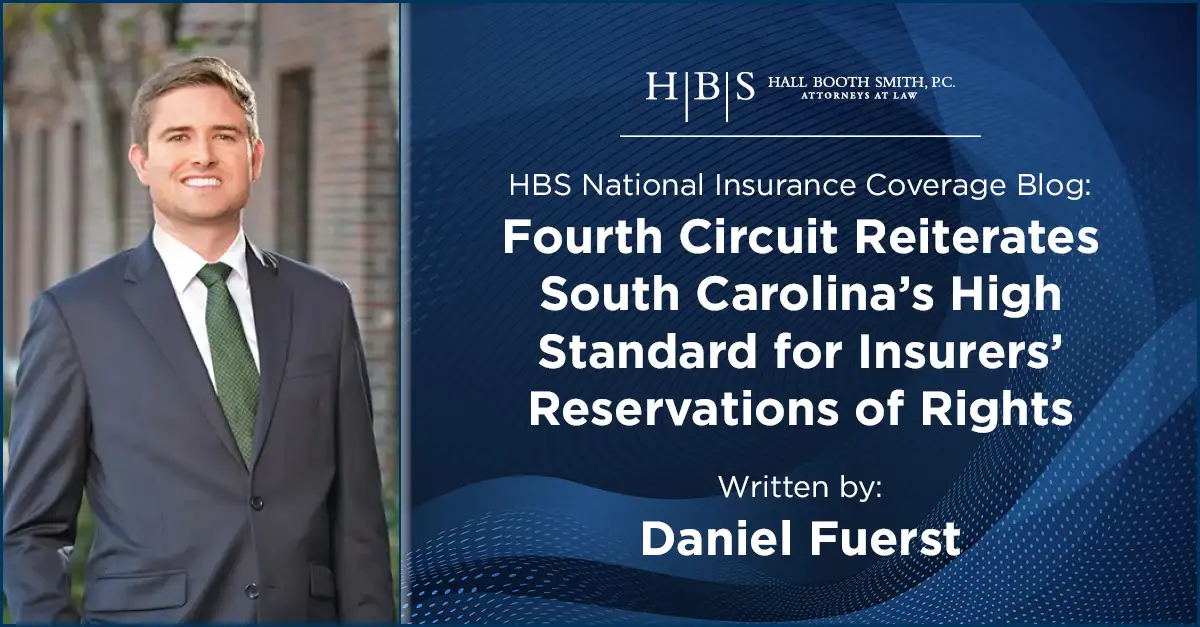
Fourth Circuit Reiterates South Carolina’s High Standard for Insurers’ Reservations of Rights
Introduction
In an unpublished, per curiam decision issued on December 13, 2022, the Fourth Circuit Court of Appeals affirmed the district court’s ruling that two insurers insufficiently reserved their rights under general liability policies issued to their insureds for claims arising out of construction defect litigation and, therefore, could not disclaim coverage.
The opinion in Stoneledge at Lake Keowee Owners’ Association, Inc. v. Cincinnati Insurance Company, and Builders Mutual Insurance Company is a reminder of the explanations an insurer must make to its insured when defending under a reservation of rights and the potential consequence of being held responsible for an entire judgment against the insured for both covered and non-covered damages.
Case Background
An HOA brought the underlying lawsuit against a general contractor and its managing member, alleging that a townhouse community was defectively constructed and caused water intrusion and other physical damage. The general contractor and managing member tendered the claims to the two insurers, who agreed to defend under their respective reservations of rights.
After a series of appeals, the South Carolina Supreme Court clarified the value of the judgments: $1 million against the managing member for breach of fiduciary and $286,022.06 against the general contractor for breach of warranty and $343,226.47 for negligence.
The HOA brought a declaratory judgment action against one of the insurers in South Carolina state court, which was removed to federal court based on diversity jurisdiction. The other insurer was brought in by an amended complaint.
On cross motions for summary judgment, the district court, applying South Carolina substantive law, granted the HOA’s motion for summary judgment, primarily on the ground that the insurers failed to reserve the right to contest coverage.
On appeal, the Fourth Circuit agreed with the district court that the reservation letters were insufficient under South Carolina law, which is governed by the South Carolina Supreme Court’s opinion in Harleysville Group Insurance v. Heritage Communities, Inc., 803 S.E.2d 288 (S.C. 2017).
Harleysville Guidance
Under Harleysville, “generic denials of coverage coupled with furnishing the insured with a copy of all or most of the policy provisions (through a cut-and-paste method) is not sufficient” to comply with the “axiomatic” principle that “an insured must be provided sufficient information to understand the reasons the insurer believes the policy may not provide coverage.”
In Harleysville, the insurer failed to reserve rights as to “whether any damages resulted from acts meeting the definition of occurrence, whether any damages occurred during the applicable policy periods, and what damages were attributable to non-covered faulty workmanship [e.g., the your-work exclusion].” Harleysville also provided guidance as to what might constitute an adequate reservation.
At the very least, an insurer should “discuss[] [its] position as to the various provisions” and explain “its reasons for potentially denying coverage.” If the reservation is ambiguous, the court must construe it strictly against the insurer and liberally in favor of the insured.
With these guiding principle in mind, the Fourth Circuit held that the letters, like the one in Harleysville, were of the “we will let you know later” variety by failing to inform the insureds that the insurers intended to litigate coverage issues and to apprise them of potential conflicts of interest.
Despite a litany of grievances with Harleysville’s rationale by the insurers and an attempt to cast Harleysville’s holding as highly fact-specific, the Fourth Circuit would not second-guess the South Carolina Supreme Court on a matter of South Carolina law.
Notably, the Fourth Circuit rejected the insurer’s challenge to Harleysville’s retroactive application to the insurers’ reservation letters, which were issued years before Harleysville was decided.
Disclaimer
This material is provided for informational purposes only. It is not intended to constitute legal advice nor does it create a client-lawyer relationship between Hall Booth Smith, P.C. and any recipient. Recipients should consult with counsel before taking any actions based on the information contained within this material. This material may be considered attorney advertising in some jurisdictions. Prior results do not guarantee a similar outcome.
Blog Overview
About the Author
Charleston Associate Daniel Fuerst focuses his practice on general liability, governmental liability, premises liability, products liability, insurance coverage, and professional malpractice matters. He also represents clients in appeals.



Leave a comment
You must be logged in to post a comment.